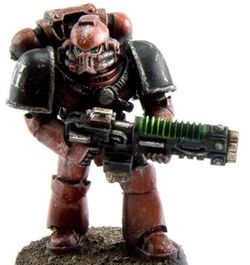
A Space Marine of the Great Crusade era armed with a Volkite Caliver

A squad of Space Marines during the Great Crusade armed with Volkite Calivers
A Volkite Weapon is an arcane term used by the Adeptus Mechanicus to refer to a class of powerful thermal ray weapons whose technology is pre-Imperial in origin and dates back to the Age of Strife. These weapons possessed considerable killing power, surpassing most other armaments of their size. Blasts from Volkite Weapons were even known to be able to penetrate the thick ceramite plates of Space Marine Power Armour with one concentrated shot. Volkite Weapons produced a deflagrating attack, in which subsonic combustion caused by a beam of thermal energy propagated through a material by thermodynamic heat transfer so that hot burning material heated the next layer of cold material and ignited it. A Volkite Weapon's heat ray had a devastating effect on organic matter, explosively burning flesh into ash and jetting fire.
Unfortunately, Volkite Weapons of the various types were difficult to manufacture, even for the most able of the Mechanicum's forges, and the demands of the expanding Great Crusade in the late 30th Millennium swiftly overwhelmed the supply of these relic-weapons. Once relatively common within the fledgling Space Marine Legions, Volkite Weapons had fallen largely from favour by the time the Horus Heresy began in the early 31st Millennium and had been superseded by the far more flexible and utilitarian Terran Bolter. Those few examples of a Volkite Weapon that remained in service were the purview of only a few specialised units at the outbreak of the conflict that tore the Imperium apart in a galaxy-spanning civil war. Volkite Weapons in the present time are exceedingly rare, and are scarcely ever seen amongst the Chapters of the Adeptus Astartes in the late 41st Millennium.
These rare weapons were also once the standard armament of a significant number of Solar Auxilia infantry sections, becoming increasingly rare as the Great Crusade had worn on, and by the Horus Heresy became the preserve of only the most elite of their Veletaris units, and to carry such a weapon became a thing of great distinction in the ranks of the Solar Auxilia, the weapons themselves passing from soldier to soldier as time went on. The weapons of the Solar Auxilia's officer class had a tendency to be highly idiosyncratic in nature, with each officer allowed to furnish their own personal arms, allowing for considerable variation and indeed competition between them to do so, with the sword of various forms being held commonly as the mark of an officer.
Volkite Weapon Variants
- Volkite Serpenta - The pistol variant of a Volkite Weapon, sometimes carried by high-ranking soldiers of the Imperial Army during the Great Crusade era.
- Volkite Charger - The assault weapon variant of a Volkite Weapon carried by Space Marine infantry.
- Volkite Caliver - A Volkite heavy weapon variant carried by Space Marine infantry.
- Volkite Culverin - A Volkite heavy weapon mounted on vehicles such as the Contemptor Pattern Dreadnought or carried by Space Marine infantry.
- Volkite Carronade - A Volkite heavy weapon variant, mounted on the Glaive Super-Heavy Special Weapons Tank, a variant of the Fellblade.
- Volkite Sentinel - Slaved weapons systems controlled independently by their own servitor-brain, Volkite Sentinels were defensive weapons found on a number of larger Mechanicum war engines, most commonly the Triaros Armoured Conveyer. Each Volkite Sentinel was a pintle-mounted Volkite charger which could be fired in addition to any other weapons the vehicle was carrying, able to target units separately from the vehicle's main armament.
- Volkite Incinerator - A powerful purpose-designed Volkite ray weapon that was mounted in the chest-unit of each Ursarax Tech-Thralls, allowing it to both attack its victims at range with a lethal Volkite beam and also more unorthodoxly by grabbing its foe within its claws and drawing them in to suffer the full brunt of this discharge at point blank range. This confined ray blast was particularly devastating in its power and it was able to render even heavily armoured warriors to cinders in mere moments.
Notable Users
- Durak Rask - The former Marshall of Ordnance of the Death Guard Legion during the Great Crusade who used a Volkite Serpenta in combination with a Thunder Hammer in battle.
- Artellus Numeon - The former First Captain of the Salamanders Legion used a Volkite weapon mounted on his Power Halberd.
Sources
- The Horus Heresy - Book One: Betrayal by Alan Bligh, pg. 233
- The Horus Heresy - Book Two: Massacre by Alan Bligh, pp. 103, 127, 205
- The Horus Heresy - Book Three: Extermination by Alan Bligh, pp. 101, 120, 224-225
- The Horus Heresy - Book Four: Conquest by Alan Bligh, pp. 83, 87, 189, 246-247
- The Horus Heresy - Book Five: Tempest by Alan Bligh, pp. 92, 181
- Vulkan Lives (Novel) by Nick Kyme
- Vengeful Spirit (Novel) by Graham McNeill
- Forge World - Volkite Calivers
- Forge World - Volkite Chargers
- Forge World - Volkite Culverin
- Forge World - Contemptor Pattern Volkite Culverin
- Forge World - Legion Glaive
